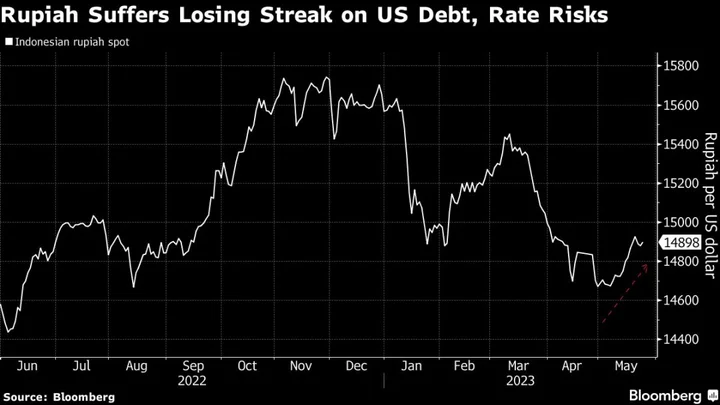Indonesia’s central bank is expected to keep its benchmark rate unchanged near a four-year high as economic growth remains resilient while the rupiah experiences bouts of selling pressure.
Bank Indonesia will likely maintain its seven-day reverse repurchase rate at 5.75% on Thursday, according to all 28 economists surveyed by Bloomberg. It’s poised to hold for a fourth straight month after 225 basis points in increases from August to January that has taken borrowing costs to the highest since July 2019.
Policymakers will likely stick with their messaging that a pause is the most prudent stance for now, with uncertainty lingering around the Federal Reserve’s peak rate and the US debt deal. The rupiah has weakened about 1.5% this month, depreciating along with most regional currencies, reinforcing Governor Perry Warjiyo’s call for patience.
“We do not expect telegraphing of any intent to cut the policy rate now as that might raise the depreciation pressure,” Societe Generale SA economist Kunal Kundu said, adding that the downturn in the country’s exports and a weaker-than-expected Chinese recovery will likely add pressure on the currency.
Here’s what to watch out for in Thursday’s decision at 2 p.m. local time:
New Tools
While Bank Indonesia has nixed the idea of further rate hikes, it could resort to macroprudential measures to boost the rupiah if selloffs persist. A revised rule requiring exporters to repatriate 30% of their dollar earnings is still pending, although the central bank’s export-targeted term deposit facility has seen lukewarm reception.
“Market participants will also be keen to watch if the Governor’s comments carry dovish undertones apart from a mention of the Operation Twist, in light of a sharp pullback in the long-term yields to-date,” said DBS Bank Ltd.’s Radhika Rao, referring to BI’s interventions to prop up short-term bonds in the secondary market.
Inflation Path
While headline inflation has cooled to 4.3% in April, BI will likely stay cautious until the gauge returns firmly within its 2%-4% target in the second half of this year, according to PT Bank Maybank Indonesia chief economist Juniman.
The threat of El Niño is also a concern for policymakers across the region, where food supplies have only recently stabilized. A severe dry spell could hit harvest and stoke prices anew.
Growth Outlook
Southeast Asia’s largest economy has enjoyed above-5% gross domestic product growth since late 2021, but there are headwinds on the horizon. Exports have shrunk for two consecutive months amid declining commodity prices and weak demand from trading partners. Investment growth and manufacturing have likewise slowed.
According to Citigroup Inc economist Helmi Arman, a rate cut may be on the table by September to bolster the BI’s 2023 GDP growth outlook of 4.5%-5.3%.
Author: Claire Jiao, Grace Sihombing and Tomoko Sato

